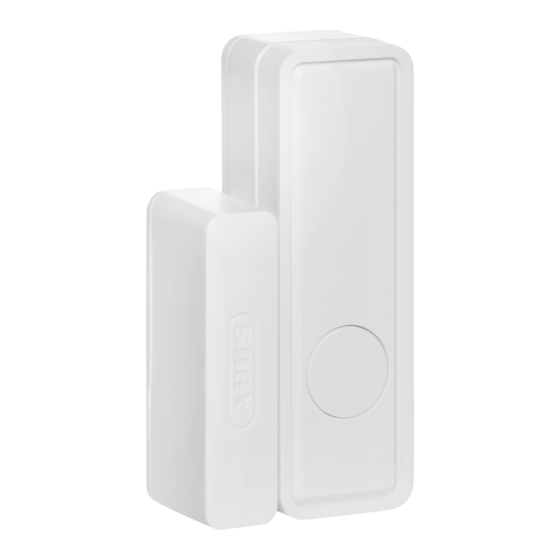
Subscribe to Our Youtube Channel
Summary of Contents for Abus Nexello PLMK10100
- Page 1 PLMK10100 Nexello bypass opening detector Important information and FAQs about this product and other products can be found on the website www.abus.com Manual version: 1.2 firmware version: 1.41...
- Page 2 ABUS Security Center is limited to the purchase price of the product.
- Page 3 Please ensure that the packaging contains the DSK (Device Specific Key) card. This card shows the DSK of your ABUS Z-Wave device. Please store it in a safe place. Every S2 (Security 2) certified Z-Wave controller requires the DSK to include (teach-in) the device.
- Page 4 English Notes on handling batteries Make sure that batteries are not in the hands of children. Children could put batteries in their mouths and swallow them. This can cause serious damage to health. In this case, consult a doctor immediately! ...
-
Page 5: Table Of Contents
English Table of contents Product launch ..........................6 1.1. Scope of delivery ........................6 1.2. Device features ........................6 1.3. Operating principle ........................7 1.4. Performance features ......................7 1.5. Use in systems of different manufacturers ................7 1.6. DSK code ..........................7 Functional overview .......................... -
Page 6: Product Launch
English 1. Product launch 1.1. Scope of delivery ABUS Z-Wave opening detector 1x Duracell CR2 battery Assembly material: screws, dowels, adhesive pads, reset tool Quick guide & safety instructions DSK card 1.2. Device features Designation... -
Page 7: Operating Principle
English 1.3. Operating principle The device was developed for use in alarm and home automation systems that use the Z-Wave wireless standard. The device has the following functions: Magnetic field sensor It uses magnetic field sensor technology to detect whether doors or windows are open or closed in a defined area. -
Page 8: Functional Overview
English 2. Functional overview 2.1. Inclusion / Teach-in device This product supports SmartStart: SmartStart-enabled products can be added to a Z-Wave network by scanning the Z-Wave QR code present on the product with a controller that provides SmartStart integration. No further action is required, and the SmartStart product will be automatically added within 10 minutes of powering up near the network. - Page 9 English The successful inclusion is displayed in the app or on the gateway and the status LED on the device lights green seconds. Repeat the inclusion process if it was not successful. If a new attempt fails as well, first carry out a factory reset on the device, see 2.5.
-
Page 10: Planning, Assembly And Installation
English 2.2. Planning, assembly and installation The device uses low-power radio signals to communicate with the Z-Wave gateway. For best results, please note the following: The device has a radio range of up to 40 m. The battery life of the device is reduced if the wireless connection to the Z-Wave gateway is not direct but via a repeater. - Page 11 English Make sure that the product fronts of sensor and magnet are as flush as possible, use the grids for adjusting the height of the magnet for minor adjustments and the spacers supplied for major adjustments.
-
Page 12: Exclusion / Device Teach-In
English 2.3. Exclusion / Device teach-in Activate the exclusion mode (learn mode) on the gateway. (for more details, refer to the operating instructions of the gateway) Press the "-" button (Remove / Exclusion) in your Z- Wave app and follow the instructions to set the gateway to Exclusion mode. -
Page 13: Reset To Factory Settings
English 2.4. Reset to factory settings Press and hold the Link button for at least 5 seconds. Release the button when the red LED stops blinking and lights up continuously. The device is now reset to factory settings. Hint: This procedure should only be used if the primary gateway is not capable of acting. -
Page 14: Behavior Bypass Button
English 2.6. Behavior Bypass button Bypass If the bypass button is pressed briefly once when closed, the bypass function is active. In this case, the next opening of the door/window is not sent as an opening alarm for the next 5 minutes. ... -
Page 15: Advanced Z-Wave Parameters
English 3. Advanced Z-Wave Parameters 3.1. Association Groups Z-Wave devices can control other devices directly. This direct control is called association in Z-Wave. The device ID of the device to be controlled must be stored in the controlling devices. This is done in so-called association groups. -
Page 16: Reports
English 3.3. Reports Notification report Event Type Attribute Parameter Length Event Parameters Opening alarm 0x06 0x16 (door / window open) Opening alarm Acknowledgement 0x06 0x17 (door / window closed) Sabotage alarm 0x07 0x03 0x00 Sabotage alarm 0x03 0x07 0x00 0x01 acknowledgement Battery alarm (replace soon) 0x08... -
Page 17: Overview Configuration Parameters
English 3.4. Overview configuration parameters Z-Wave products can be used directly after inclusion in the network. However, configuration settings can be used to adapt the behavior of the device even better to the requirements of the application and to activate additional functions. Para- Byte Default value... -
Page 18: Supported Command Classes
English 3.5. Supported command classes Command class Version Association Version 2 Association Group Info Version 3 Battery Version 1 Central Scene Version 3 Configuration Version 4 Device Reset Locally Version 1 Firmware Update Md Version 5 Indicator Version 3 Manufacturer specific Version 2 Multi Channel Association Version 3... -
Page 19: Technical Data
English 4. Technical data Parameters PLMK10100 Dimensions (W x H x D) 90 x 61 x 42,5 mm Weight 59 g >0° – 40°C Operating temperature IP class IP 20 (indoor area) Radio frequency 868.42 MHz (Z-Wave Plus, European) Modulation FSK (BFSK/GFSK) Transmitting power: <...














Need help?
Do you have a question about the Nexello PLMK10100 and is the answer not in the manual?
Questions and answers